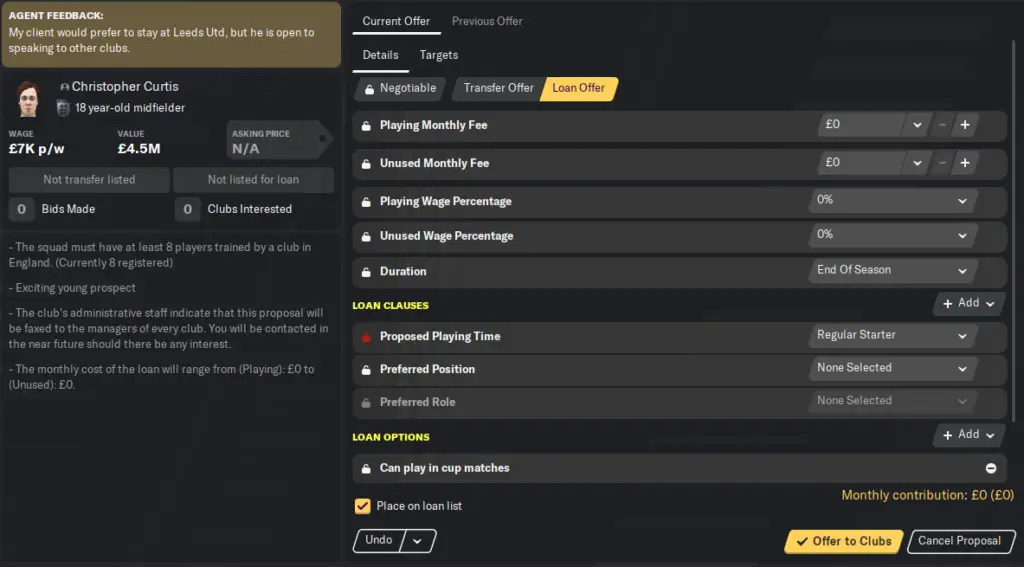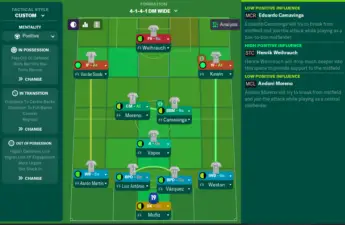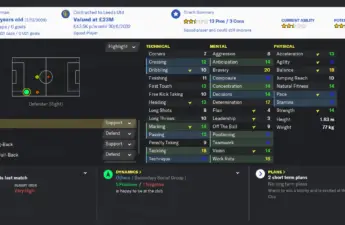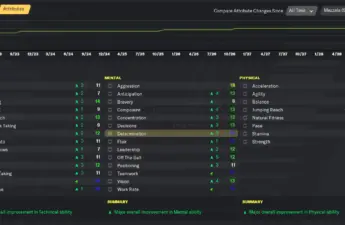There are few things better in football manager, than seeing that young centre back you snagged from FC København at only the age of 15 develop rapidly into a beast of a player. But a time comes when you are in a dilemma, would the centre back develop better in your youth team, or should you send him out on loan to get minutes in a smaller club?
As is often the case in football manager, the answer is “it depends”.
Several factors have to be considered before leaning on either side, these include;
- Is the young centre back homegrown?
- Is he good enough to start in your first team squad?
- Is his personality good enough, or does he need more tutoring?
- What are the league rules regarding loans?
- Does he have a work permit?
Finding answers to these questions would give you a clearer picture on what to do with your future star.
Loans vs Youth Games
Generally, club facilities play the biggest part in player development from the moment they come through the youth academy until they turn 18. Once they get to 18, play time in a competitive league becomes the most important factor, surpassing the club’s facilities.
Therefore, as a rule of thumb, do not loan out players who have not yet turned 18, as chances are the club you are loaning him out to has poorer facilities and weaker coaches than yours, therefore hampering the player’s development despite getting first team football.
If the player at such a young age is so good that you feel he could do a job in a competitive league, it is better to promote him to the senior squad, then make him available for the under 23 and 18 matches.

This way, you would be able to give him minutes towards the end of matches where you are comfortably in the lead or in cup competitions, while he still enjoys the benefits of training in superior facilities.
Best Time to Loan Out Players
I generally group my youngsters into three groups;
- Those who I think are good enough to feature in the first team occasionally.
- Those who are decent but not good enough for my first team, although they might attract a decent transfer fee.
- Those who are not good enough and are better released or sold immediately at a throwaway price just to get them of the wage book.
The last group is more straightforward, as I normally put them on the unwanted list and ask my director of football to sell or release them if there are no takers.
Youngsters Good Enough for First Team Football
For the first group, which is the most important, analyse whether you would be able to give the youngster at least 15-20 starts in the upcoming season, while also still giving him minutes towards the end of games and in cup matches.
If you can do this comfortably, bonus points if the youngster can play multiple positions, then it is better he stays at the club rather than going on loan.
However, if you cannot guarantee minutes to the lad, maybe because the player ahead of him is too good or your bench is too strong, then finding a loan for him is the best thing to do.
Youngsters Not Good Enough for First Team Football
Those who fall into this category, of being good but not good enough, a loan is always the best option.
Maybe all they need is two years of consistent first team football before they become an important squad member for your team.
If they do not develop as you would like despite being loaned out, you can always sell them, then use the money acquired to scout for more potential wonderkids.
When selling young players, remember it is always better to accept a slightly lower fee then insert the “percentage of future fee” clause of at least 30%. This way when the player develops for a few more years and is sold for a significantly higher fee, you still stand to earn a tidy amount from the deal.
5 Factors to Consider When Loaning out Players
- Play Time. At the loan negotiation screen, lock the padlock with player status at regular starter or key player, depending on how good you think your youngster is, then offer him out. This way, you will only receive bids from teams ready to give your player regular football.
- Club facilities. Despite game time being more important at this stage, facilities still play a part, and it is better for your young player to play in a club whose facilities are decent.
- League reputation. Loaning a player to a La Liga side is better than loaning him to a championship side. The better competition he faces week in week out will help him develop more rather than dominating teams in a weaker league.
- Club Mentality. There is nothing worse than seeing the personality of your model professional wonderkid drop down to professional or lighthearted. Therefore, before sanctioning a loan deal, take a look at the club’s general personality in their home screen, then decide whether it will have a net positive or negative change in your youngster.
- Tactic being used. It is pointless to loan your attacking midfielder to a team that plays a system with no attacking midfielders. He will either rot on their bench or be forced to play a position he is not suited for, basically wasting his loan spell learning a new position.
When Loaning Out is not the Best Option in Football Manager
As already mentioned, sending players out on loan at the age of 18 is not always the right move, and waiting for one or two more seasons could be better.
One reason for this, is wanting the young player you have signed at the age of 17 or 18, to be homegrown at the club before loaning him out.
This is very important as you could be faced with a situation where you can not register players because you do not have enough homegrown players at your club.
In most leagues, homegrown players need to have stayed at the club for at least three years before they turn 21, waiting one more year before sending a player out on loan to different country could make a huge difference.
Another reason could be wanting the personality of the youngster to improve before sending him out on loan.
It is better in this circumstance to have the player around the club so that you can put him in a tutoring group where he will stand the best chance of improving his personality.


